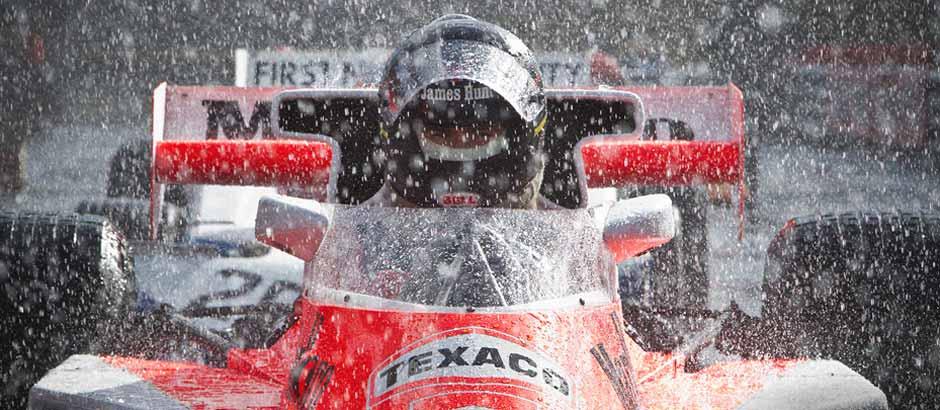Ron Howard delivers his typical theme park drama with F1 biopic Rush, which is up there with his best, says MacDara Conroy
Look at the posters plastered about town for Rush, Ron Howard’s 1970s Formula 1 biopic, and it’s Chris Hemsworth as notorious gadabout James Hunt whose over-sharpened fizzog is front and centre. If his co-star Daniel Brühl is pictured at all he’s relegated to the background, peering over shoulder at his rival with a mixture of envy and disgust. They’re the same mixed emotions you might yourself feel in the opening scenes as Hemsworth’s Hunt bursts onto a hospital ward, bloody-nosed and battle-scarred after the kind of fight only manly men have, and in a matter of minutes charms the uniform off the kind of nurse you thought only existed in Carry On movies (in this case a wasted Natalie Dormer, used to meatier roles in The Tudors and Game of Thrones).
Quick as a flash (pun definitely intended) we’re at the race track for a lower formula meet, and Hunt’s team get the exposition out of the way: he’s a young go-getter, hungry for the prize, just needs that one shot, etc etc. And it’s here where he first crosses paths with stone-faced up-and-comer Niki Lauda (Brühl), the kind of man they say ‘doesn’t suffer fools gladly’. But Lauda’s too much of a straight-shooter for such euphemism: he’s a self-professed “asshole” who’s got no truck with the glitz and glamour and party lifestyle, nor indeed any inessential human contact. For him all that matters is having the right car to win the biggest races, even if he has to buy his way into the top tier of the sport to achieve it. What a buzzkill, eh?
Even Howard seems to think so, leaving Lauda’s story on the back burner while he gets carried away with the Hunt phenomenon: the jet-setting lifestyle, the supermodel girlfriend-cum-wife (an orange-tanned, chisel-jawed Olivia Wilde), the silly little affectations like the tiny Mini Cooper he tears around in. He’s the larger-than-life swashbuckler that Formula 1 wants, even if Lauda is the man it needs.
The same goes for Rush, too, as once Hunt’s Icarus parable has been established, which is quite early on, slowly but surely it morphs into Niki Lauda’s movie. It’s driven by his status as the underdog despite his superior gifts not only for driving but for setting up the car, precipitating F1’s future as a sport for engineers and cool customers like Michael Schumacher, not playboy winners turned tragic figures like Ayrton Senna (the subject of an affecting documentary in 2010). Lauda’s nerdy obsessions and absence of social graces are endearing, in no small part due to Brühl embodying him – or at least the idea of him – so well; Hemsworth as Hunt is play-acting at best. It might be the playboy front and centre on the poster, but it’s Lauda we’re with all the way as he battles Hunt for the F1 championship, their simmering rivalry reaching boiling point at the 1976 German Grand Prix. It’s a life-changing event for both, resulting in triumph and tragedy – though for whom it only becomes clearer at the end.
Of course, like his previous biopics, whether it’s Apollo 13 or Frost/Nixon or A Beautiful Mind, Howard is liberal with the truth: there is a thing that happened, there are certain people involved, but everything else is probably bullshit, with a heap of schmaltz slapped on for good measure. But who cares when it’s such a hell of a ride? Turning Peter Morgan’s screenplay into high-speed thrills, Howard delivers his typical theme park drama in spades with Rush, which is up there with his best. And it’ll be a crime if Brühl is overlooked for an Oscar nod next year.


